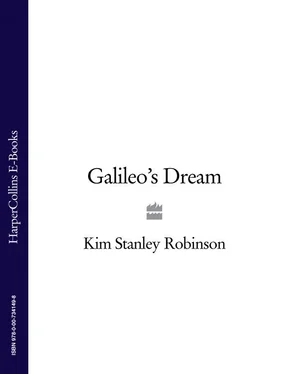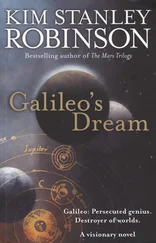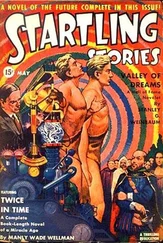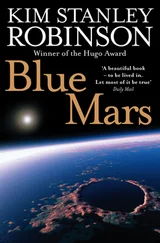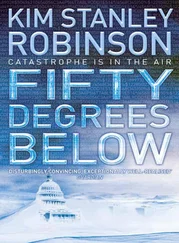Now the great Servite led Galileo to the Doge, and after a cordial greeting Dona led the entire group into the Sala delle Quattro Porte, then to the Sala del Senato, where many more senators stood in their purple around tables loaded with food. Under the intricacy of crowded paintings and gilt trim that covered every wall and ceiling, Galileo pulled the two parts of his device from their case, and screwed the spyglass on top of the tripod. His hands moved without a quiver; twenty years of lecturing to audiences large and small had burned all possibility of stage fright out of him, and it was also true that it was never that difficult to speak to a crowd to which you felt innately superior. So even though all his hundreds of lectures were now only the prelude to this culmination, he was calm and at ease as he described the work done to make the device, indicating its various features as he pointed it at Tintoretto’s ‘Triumph of Venice’ on the ceiling at the far end of the room, fixing the image in the glass so that it revealed the tiny face of an angel enlarged to the point that it stood out even more vividly than Mazzoleni’s had on that first night of work.
With a sweep of his hand he invited the Doge to have a look. The Doge looked; pulled away to gaze at Galileo, his eyebrows shot high onto his forehead; looked again. The two big clocks on the long side wall marked ten minutes’ passage as he bumped the glass from one view to another. Ten more minutes passed as one purple-robed man after another took a look through the glass. Galileo answered every question they had about how it was made, although failing to bring up the ratios he had discovered, which they did not even know to ask about. He volunteered often that the process being now clear to him, future improvements were certain to follow, and also (trying to hide a growing impatience) that it was not the kind of device that could best be demonstrated in a room, even a room as big and magnificent as the Sala del Senato. Finally the Doge himself echoed this point, and Sarpi was quick to suggest that they take the device to the top of the campanile of San Marco to give it a thorough airing. Dona agreed to this, and suddenly the whole assembly was following him out of the building and across the Piazzetta between the Signoria and the campanile, then inside the great bell tower, winding up the tight iron staircases to the open observation floor under the bells. Here Galileo reassembled the device.
The floor of the viewing chamber stood a hundred braccia above the Piazza. It was a place all of them had been up to many times; from here one could overlook the whole of Venice and the lagoon, and spot the passageway through the Lido at San Niccolo, the only navigable channel into the Adriatic. Also visible to the west was a long stretch of the mainland’s marshy shore, and on clear days one could even see the Alps to the north. A better place to display the powers of the new spyglass could not have been found, and to aim it Galileo looked through the device with as much interest as anyone else, or even more; he had not yet had an opportunity like this, and what could be seen through the glass was as new to him as the next man. He told them as much as he worked, and they liked that. They were part of the experiment. He stabilized and sighted the glass very carefully, feeling that a little delay at this moment was not a bad thing, in theatrical terms. As always, the image in the eyepiece shimmered a little, as if it were something conjured in a crystal ball by a magician-not an effect he wanted, but there was nothing he had been able to do about it. Feeling a sharp curiosity, he tried to spot Padua itself; on earlier visits to the campanile he had marked the vague tower of smoke coming from the town, and knew precisely where it lay.
When he got Padua’s tower of San Giustina centred in the glass, as clear as if he were on Padua’s city wall staring at it, he suppressed any shout, any smile, and merely bowed to the Doge and moved aside, so Dona and then the others could have a look. A little touch of the mage’s silent majesty was not inappropriate at this point, he judged.
For the view was in fact astonishing. ‘Ho!’ the Doge exclaimed when he saw San Giustina. ‘Look at that!’ After a minute or two he gave over the glass to his people, and after that the rush was on. Exclamations, cries, incredulous laughter: it sounded like Carnivale. Galileo stood proudly by the tube, readjusting it when it was bumped. After everyone had had a first look, he spotted terra ferma towns even more distant than Padua, which itself was twenty-five miles away: Chioggia to the south, Treviso to the west, even Conegliano, nestled in the foothills more than fifty miles away.
Moving to the northern arches, he trained the glass on various parts of the lagoon. These views made it clear that many of the senators were even more amazed to see people brought close than they had been buildings; perhaps their minds had leaped as quickly as Galileo’s servants to the uses of such an ability. They gazed at worshippers entering the church of San Giacomo in Murano, or getting into gondolas at the mouth of the Rio de’ Verieri, just west of Murano. Once one of them even recognized a woman he knew.
After that round of viewing Galileo lifted the device, helped now by as many hands as could touch the tripod, and the whole assembly shifted together to the easternmost arch on the southern side of the campanile, where the glass could be directed over the Lido and the fuzzy blue Adriatic. For a long time Galileo tapped the tube gently from side to side, searching the horizon. Then happily he spotted the sails of a little fleet of galleys, making their final approach to the Serenissima.
‘Look to sea,’ he instructed them as he straightened and made room for the Doge. He had to restrain himself to remain serious, to hide his euphoria. ‘See how using one’s plain sight, one sees nothing out there. But using the glass…’
‘A fleet!’ the Doge exclaimed. He straightened and looked at the crowd, his face red. ‘A fleet is approaching, well out from San Niccolo.’
The Sages of the Order crowded to the front of the line to see for themselves. Every Venetian holding in the eastern Mediterranean was subject to attack by Turks and Levantine pirates: individual ships, fleets, coastal towers, even fortress towns as formidable as Ragusa had suffered surprise assaults. Thus the rulers of Venice, all of them with naval experience of one sort or another, were now nodding to each other meaningfully, and circulating into the crowd surrounding Galileo to shake his hand, slap him on the back, ask for future meetings. Fra Micanzio and General del Monte in particular had worked with him at the Arsenale on various engineering projects, and their congratulations were especially hearty. They had first met him twenty years before, when they had brought him in to consider if there were ways the oars of their galleys could be reconfigured to give them more power, and Galileo had immediately sketched out analyses of the oars’ movement that considered their fulcrum to be not the oarlocks, but the water surface; and this surprising new perspective on the problem had in fact led to improvements in oarlock placement. So they knew what he was capable of; but this time del Monte was shaking his hand endlessly, and Micanzio was grinning, with eyebrows raised as if to say: Finally one of your tricks will really matter!
And at this moment Galileo could afford to laugh with him. Galileo suggested to him that they time the interval between this observation of the fleet through the glass, and the moment when ordinary lookouts saw the ships with their unaided vision. The Doge overheard this and required that it be done.
After that Galileo had only to stand by the device and accept more congratulations, and point the thing to resight it if someone requested it. He drank their praise and he drank wine from a tall gold cup, feeling expansive and generous, the colourful throng around him with its impressive percentage of purple sparking more memories of Carnivale, memories that gave every festive evening in Venice an aura of splendour and sex. Combined with the height of the campanile, and the beauty of the watery city below them, it felt like they stood on Olympus.
Читать дальше
